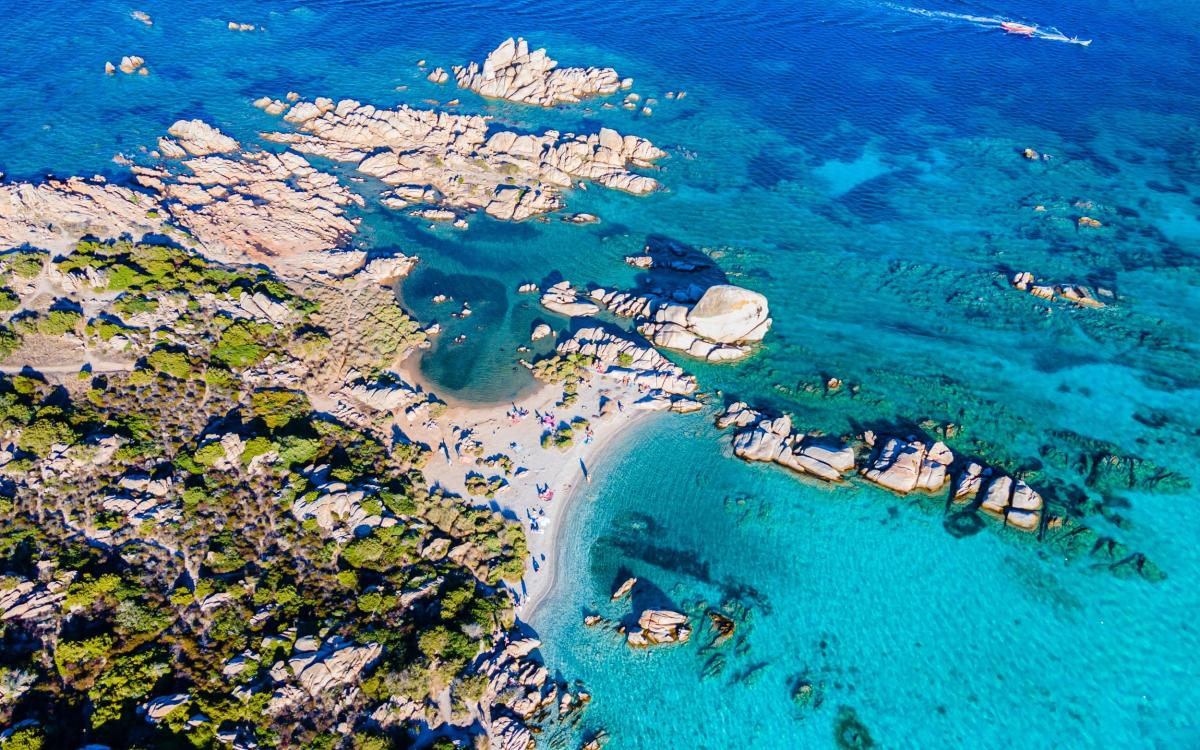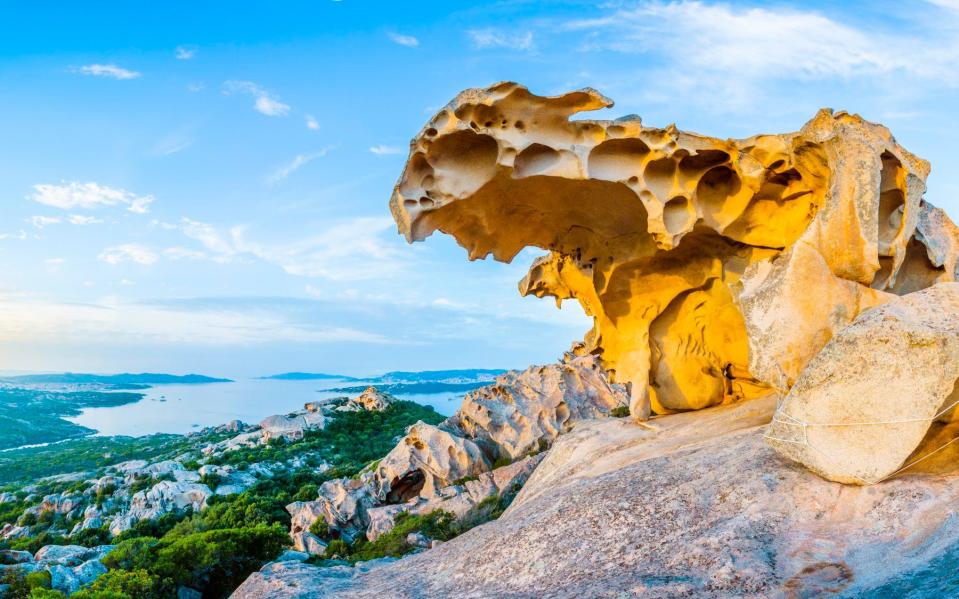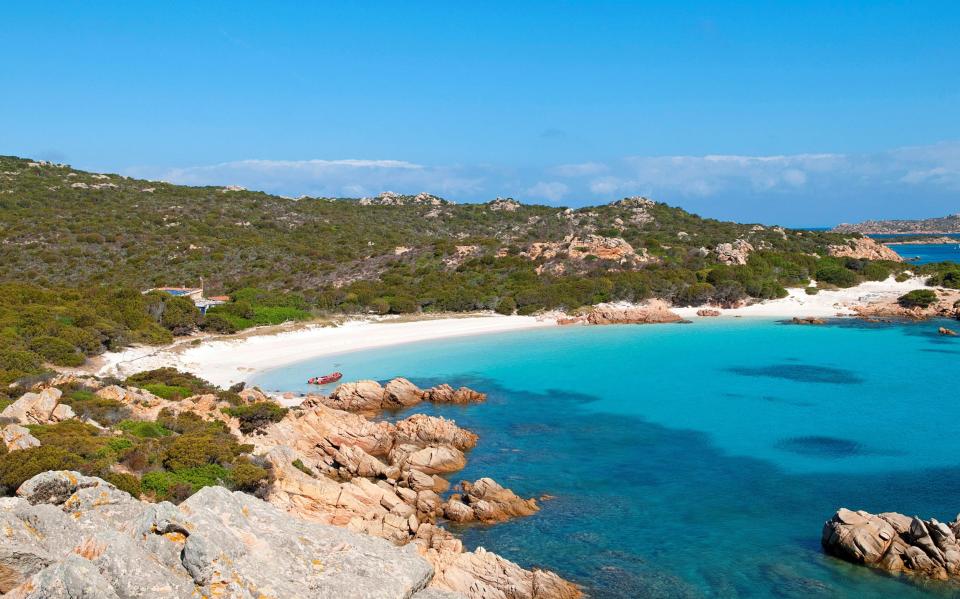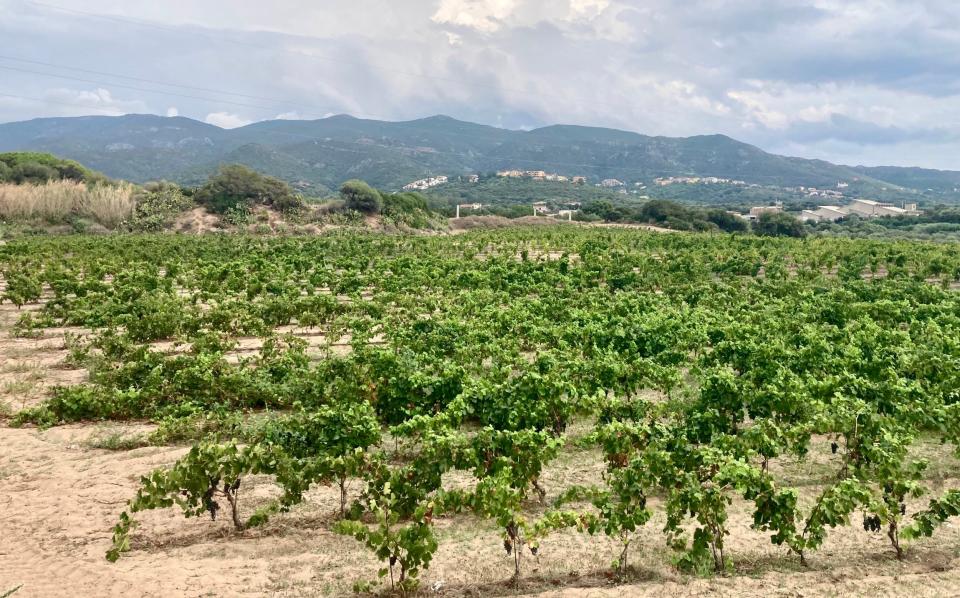Sports
Sardinia’s answer to the Seychelles – for a fraction of the price

“Well?” my walking guide Nicolò Cherchi grins, pointing out the Roccia dell’Orso, as we hike up before the heat rises. I squint in the morning light to make out the shape of a bear. An impressive hunk of granite perched at Sardinia’s north-eastern tip, the rock has been whipped into shape by wind and waves over 300 million years, and has been a point of navigation for seafarers since antiquity.
“Legend has linked this spot to the Laestrygonians in Homer’s Odyssey,” says Nicolò, as we stomp past slopes fragrant with myrtle, broom and mastic.
Never mind bears and Homeric cannibal giants – what a view. The trail scrambles up to a cave that frames the deep sapphire Strait of Bonifacio, where the pink-granite Maddalena Islands form stepping stones to Corsica. It’s the kind of view that hoovers up Instagram likes, yet we are alone here at this early hour. Nicolò has seen it a thousand times, but it has entranced me.

The bear is a fitting introduction to the region of Gallura, which turns wild the moment you step north of the celeb-magnet Costa Smeralda. This is a different Sardinia entirely: one immune to time and trends. Narrow roads run riot through hills brushed silver-green with juniper, myrtle, cork, holm oak and olive. Bronze Age tombs hide in lonely fields where cicadas hum. Ignore the map: Gallura is far vaster than it appears on paper. You can drive for miles and barely see a soul.
If the hinterland is remote, the coast enthrals with some of the dreamiest beaches you will ever see on European shores, where flour-white sands fizz into an azure sea so clear it’s like peering into a goldfish bowl. Disney thought so too – many scenes in the 2023 film The Little Mermaid were filmed on these shores. Throw in some striking granite boulders and you can see why comparisons to the Seychelles come thick and fast. Yet it’s an easy two-hour flight from the UK instead of 12.
More an extension of nature than a hotel, Valle dell’Erica resort is my eco-friendly and stylish base. The sea takes centre stage: in light-drenched rooms with views of distant islands and castaway bays, on maquis-fringed trails leading to the white smile of La Licciola beach, in infinity pools and at the thalassotherapy spa where treatments embrace the healing power of coastal herbs, flowers and algae. As the stars spread their glitter across the inky night sky, I gorge on antipasti, boat-fresh fish and seafood, homemade pasta and porceddu (suckling pig slow-roasted over an open fire).
From Valle dell’Erica, boats breeze quickly over to the Maddalena Archipelago National Park. I cling on as we bump over white-tipped waves, peering across to the uninhabited isle of Spargi, where a Roman shipwreck lies buried. As we approach Budelli, the water is pure aquamarine – clear as stained glass and as calm as a lagoon. The skipper points out Spiaggia Rossa, a heavenly bay whose pink sand comes from high quantities of crushed coral. As tourists frequently pinched the sand as a souvenir, access to the beach has been closed off for two years, but it can be admired from its just-as-pretty neighbour, Spiaggia del Cavaliere.


As we board the boat, the skipper struggles with the anchor and for a moment it looks as though we’ll have to stay put. It could be worse, I think.
Back on dry land, I head west to Santa Teresa di Gallura, a cheerful seaside town of candy-bright houses and roads winding down to the sea. Sun-bronzed locals and holidaymakers are milling around the 16th-century Aragonese watchtower and filling terrace tables on the piazza. An aperitivo is tempting, but not before I’ve seen some rock stars.
A storm is blowing in at lighthouse-topped Capo Testa nearby. Waves boom furiously and the sea appears pewter beneath a graphite sky. Paths whip past enormous, bizarrely shaped boulders. Beyond the dramatic setting, there’s a special energy here that I can’t quite put my finger on. And everyone from summer festival-goers to meditating Tibetan monks thinks so. Across the strait, the mountains of Corsica look close enough to touch.
The next morning dawns bright for a road trip through rugged, thickly wooded hills to Aggius – Gallura’s very own Wild West, where traditions and blood run deep. Here, geometric-patterned rugs are still hand-woven on horizontal looms and, until a few decades ago, the area was infamous for bandits. Silent and surreal, the nearby Valle della Luna (Moon Valley) would have been the perfect escape for outlaws, with the sun beating down on granite outcrops. It looks like a film set and is: recent flicks shot here include the 2018 Italian film Il Principe Libero.
But people were here long before the directors rocked up, with many a dusty track leading to nuraghi, Bronze Age towers of which Sardinia has more than 7,000. With its largely intact tholos, Nuraghe Izzana is one of Gallura’s most impressive. Touching its rough-hewn granite and gazing out across wild, stone-strewn pastures, you really feel the pulse of the island’s mysterious past.
Back on the coast, I’m content to swing in a hammock under centuries-old juniper trees and pines at Le Dune, an eco-conscious resort and spa that rambles prettily over the dunes fringing Li Junchi beach, a five-mile sweep of frost-white sand. Days spent swimming in the sea rounded off with knockout sunsets and multi-course feasts. Cooked fresh in front of my eyes, the seafood at the tree-canopied Lo Scorfano restaurant is some of the best I’ve ever eaten.
But a cork pop away is Cantina Li Duni, a family-run winery where ungrafted vines are planted directly in the sand where the dunes taper out. In late August, the harvest is underway and sweet smells hang in the air.


“We are right next to the sea and you can taste it – our wines have a unique salinity,” says third-generation vintner Francesco Addis, with twinkling eyes, as we raise a glass of his crisp, elegant Vermentino white and nibble on wafer-thin pane carasau flatbread with local pecorino, olives and salumi. “My earliest memories of wine are of this time of year – the bustle of the harvest, my grandfather opening the faucet on the first young wine.”
Now upholding these traditions with a massive nod to sustainability, Addis darts from heavy-laden vine to cellar and tasting room, where he cracks open bottles of his excellent sparkling wines, whites and rosés, as well as Cannonau reds tanked with anti-ageing polyphenols said to contribute to the island’s extraordinary longevity.
“I love my job – my life here. I rarely leave the vineyard, but I don’t feel like I am missing out. This is happiness,” he says, gesturing across vines reaching to the glittering Gulf of Asinara, now lit by the honeyed late-afternoon sun. It’s the kind of romantic view that makes you long to ditch the day job and start Googling properties.
But a whisper away, sunset is reddening the granite rocks on the Costa Rossa and I can watch the entire spectacle from my sea-facing room at Hotel Marinedda, a coastal resort that almost seems to melt into the maquis. The days here race by, with swims in saltwater pools and in the crystal-blue sea, and afternoons in the spa, where thalassotherapy pools and massages with citrusy Sardinian pompia oil leave me floating on air. All restraint goes out of the window at the nightly alfresco buffet, where chefs serve local oysters and langoustines, fresh pasta and grilled steaks. It’s a hefty shot of la dolce vita.
Early on my final morning, I walk the trail down to the beach. All is quiet and the jewel-like sea is as still as a millpond. Suddenly, a wild boar emerges from the pine forest and stops dead on the track in front of me, casting a sideways glance before continuing on its way. How many resorts have their own resident wild boar, I wonder. Only in Gallura.
How to do it
Ryanair and easyJet fly direct from London to Olbia in 2h 30m. Alternatively, ferries run between Olbia and Bonifacio (Corsica) and Livorno and Genoa (Italy). Hiring a car is advisable for exploring as much of the region is remote. At Valle dell’Erica, Le Dune and Hotel Marinedda, double rooms including half board start at €340 (£284), €196 and €260 respectively.
Kerry Walker was a guest of Delphina hotels.





